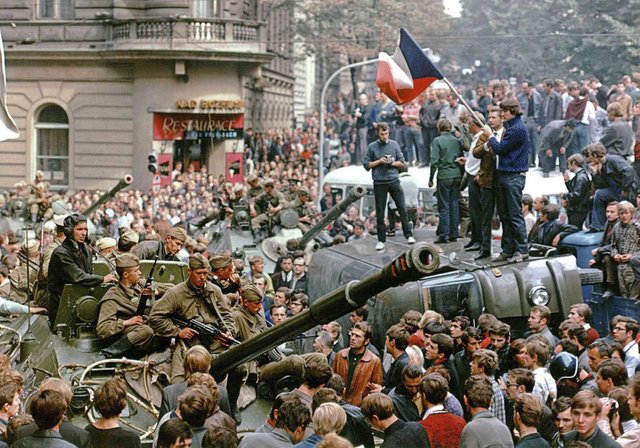1968 - Prague Spring
A period of political liberalization and mass protest in Czechoslovakia prompts Soviet troops to occupy the country, who were met with widespread civilian resistance and defiance.

Under Soviet rule, Czechs struggled to reconcile their personal identity with a strict Community regime, and the heavy hand of Communism had also strangled their economy. In the midst of an economic downturn in 1965, Czechoslovakia's Soviet-backed General Secretary, Antonín Novotný, sought to restructure the country's economy using a more liberal model. This inspired a country-wide call to reform other policies as well.
Under Novotný, a new generation of Czechoslovakians arose who opposed the Soviet system. They found a leader in Alexander Dubček, a rising star in the Communist Party and a member of both central committees on the country's Czech and Slovak federations. Dubček began to rally support from fellow reformists against Novotný until the latter finally resigned in January 1968 with Dubček quickly named in his place. After he took office, Dubček launched a reform program called "Czechoslovakia’s Road to Socialism" in an attempt to not only slowly democratize Czechoslovakian politics but to also revitalize the country's stagnant economy.
The press now enjoyed more freedoms as did civilians while state controls were relaxed and individual rights expanded. Dubček described his platform as "socialism with a human face" as the Prague Spring swept across the country. While Dubček was careful to reassure Czechoslovakia's loyalty to the Soviet bloc, the rapidity and depth of the reforms were too much Moscow to tolerate.
In July 1968, after a meeting between the Soviet Union and other satellite states, a letter was sent to Czechoslovakia that warned against the country's continued reforms. Dubček refused to bend. "We will keep following the direction that we started pursuing in January of this year," Dubček responded in a televised address.
The Soviet Union responded by launching a military invasion into the country on Aug. 28, 1968, with tanks reaching the streets of Prague the same night. More than 2,000 tanks and between 250,000 to 600,000 troops from the U.S.S.R., Hungary, Bulgaria, East Germany, and Poland invaded Czechoslovakia to put an end to the Prague Spring.
Soon, the streets of Prague, which had enjoyed at least seven months of liberalization under Dubček's reforms were riddled with unrest. Dubček urged civilians to cooperate with Warsaw Pact forces in a broadcast over Prague's public radio.
But the people of Prague did not heed his warning. Unarmed protesters threw their bodies into the paths of the tanks anyway in an attempt to blockade the streets from the Soviet invasion. A 1990 declassified report of the Prague Spring revealed that 82 people were killed during the occupation while 300 others were seriously injured. Many of the Prague Spring victims were shot, according to the report.
Dubček remained defiant that the Prague Spring would survive Soviet oppression and declared, "They may crush the flowers, but they cannot stop the Spring." However, Dubček and other party leaders deemed complicit in the reforms were forcibly sent to Moscow. After being interrogated by Soviet Union government heads, Dubček was released and allowed to return to Czechoslovakia. Upon his return to Prague, Dubček gave an emotional address to the public. He could not continue his speech without breaking into tears and then he went silent. Just as the Soviet curtain had broken his country's spirit, so too had Dubček been broken.
By April 1969, following the immolation of Jan Palach and increasing civil unrest, Dubček was ousted as head of the Communist Party. He was replaced by Moscow-backed Gustav Husak, whose reign was to be far more strict. Under Husak, Czechoslovakia underwent a "normalization" period during which mass purges of supporters of the Prague Spring were implemented and traveling was restricted.
For more images and details from events in 1968, head over to History0x